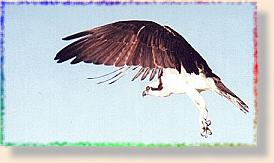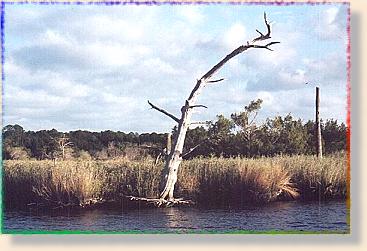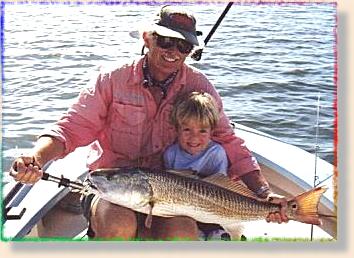He looked down. From around his toes, a puff of dust rose like
a small cloud. With every step, and with a watchful eye, he studied
these little clouds. A look of approval washed over his face.
A hearty smile said it all. The boy, with one hand clutching
his grandfather's hand, kept stepping softly. His bare feet made
contact with each step. Each step followed a rise on the dirt
path to the ramp. He never looked up until he reached the dock.
And his whole expression changed when he saw my dog Robbie, the boat,
and me. But he was still smiling. "Grandpa, we catch fish now?"
he asked.
Grandpa just nodded, "yes, my boy."
"Robbie going fishing too?"he asked.
Everyone nodded yes.
I studied him. His name was Dillon. He had his dad's big blue eyes
and blond hair. His Grandpa and I were good friends. Like Dillon,
we never wore shoes until we were in the first grade. I knew the
feeling of dry, loose dirt. Also, of wet grass early in the morning.
Mamma would shoot us if we came running in the house without wiping
our feet on the straw mat. Going bare foot had its pluses. Even
through the tall grass and the creeks. We almost never wore shoes.
Shoes were reserved for Sunday. And since they were always
hand-me-downs, they didn't fit that well. We had to put newspaper
or socks in the toes. Eventually you grew into them. I knew
Dillon's Grandpa well and I knew he never wore shoes except when
it was really cold. Neither one of us wore shoes in the boat.
Dillon looked into the clear water and watched some fish swim along
the shallows.
I'm sure he would have loved just sticking his feet in the creek.
The cool water would have felt great. But we were going fishing.
Gramps took a towel and brushed the dirt from Dillon's feet.
Then picked him up and handed him to me.
"My, you're getting bigger every day," I said to Dillon. He just
looked at me with bright eyes and smiled. He put his arms around
me and gave me a big hug. Then he put his arm around Robbie and
hugged him. Robbie just sat down and arched his head back toward
Dillon. The signal was clear; "You can scratch my neck and ears
now." Dillon obliged Robbie. This was going to be a great day.
What better company, than my best friend and his grandson.

We motored down Strickland Creek. Gramp gave the guided tour.
"Look, over there." He pointed to an Osprey who just lifted off a
branch. They hunt in pairs and are a good sign when fishing.
Then Gramp spoke about the old days. We listened intently, as
he talked about things that were very familiar to me. Growing
up in the backcountry was a simple way of life with few complications.
"Our folks worked really hard. Dad had a steady job but also did
extra work like clearing land with my uncles. They did this by
hand with double-bladed axes and bow saws. They cut timber on
weekends just to make some more money. Mom and her sisters did
wash and sewing and all kinds of odd jobs just to keep food on
the table." Gramps told Dillon about chores the kids were
responsible for and how important it was to obey your folks.
"There was no sassing then - the penalties were too great," he
said. We didn't have TV and you couldn't be sent to your room,
because you didn't have a room to yourself. Suddenly talking
about the past took a turn when a tarpon rolled on the water.
Never leaving sight of the bubble trail, Gramps reflected on fishing
the creeks when he was Dillon's age. "We used old sticks with
string and some hooks. We fished the creeks with gigs we made
from sticks and would spear fish. There were no slot or bag
limits then. We fished for a reason - food. We kept only
the bigger fish. That made it different." That's why we are
real selective about keeping fish now. Mostly we catch and
release them.
We followed the bubbles laid out by the rise. Quickly, Gramps took
a rod from the holder and cast a top water plug to the leading edge
of the bubbles. He worked the lure back and forth, like a dead
mullet. He was a master angler. He always caught fish. We
all learned from him. Two casts later there was nothing following
the plug. We moved farther down the creek. We checked the banks
for signs of movement or tailing fish. The grass was covered by
the high tide. On the last turn in the creek we entered the river
and headed west. This has to be one of the most beautiful places
on earth. Gramps and I love this river and so few people fish here.
We rounded a switch back and a place we call the bucket. It got
its name years ago when someone had left a large blue bucket hanging
from a tree. The strangest thing is that on the opposite bank you
can always catch fish. This is one of those places that few people
know about and fewer less know about fishing the bucket. As
we got closer to the bucket we made two casts along the grass line.
I started a quick retrieve on a white popper. Gramps started from
the bow using the top water plug. We both worked the grass line
when Gramps hooked up. The snook came crashing out of the grass
after the plug and hit it so hard that I thought Gramps would loose
the rod. The fight was fast and furious. Gramps' snook was
almost to the boat when I hooked up another snook on the popper.
Dillon was beside himself, "let me fish."
"Ok, Dillon, here take my rod," I said, as I grabbed a fly rod with
a pigfish popper tied to the tippet.
I quickly stripped thirty feet of line onto the back deck. I held
the popper with my left hand as I started a fast false cast. Then
I let the popper go and did one back cast and hauled as I let the
fly cast forward to the edge of the grass line. Strip, strip, BAM!
A big snook came out of the grass and slammed the fly. Now we had
three fish on. Dillon was doing all he could to just hang on to the
rod. My snook took off towards the bow. Gramps had already taken
his snook and released him. With his quick hands, he grabbed my line
and moved it slightly upward and snagged the snook by the tail with
his hand. I have to say that I have never seen this done. That
snook came to a screeching halt, and spit the hook. Gramps held
him upside down by the wrist in front of his tail. Wow. Talk
about fast reflexes. "Gramps, were did you learn to do that?" I
asked him. Maybe we don't need the fishing rods. Gramps just
smiled. I think he was shocked that he actually did it.
I could tell Dillon was getting tired. My offer of help was
refused and he held on to the rod with all his strength. Gramps
and I just looked at him and admired his gumption. This little
guy was hanging on to a large snook. But the snook was running
out of steam. Dillon kept reeling. After a while the snook
was close to the boat.
"Dillon, let Gramps help you bring in your fish," I said.
"Ok" was his reply. Gramps took the line and eased the snook to
the boat. This was a terrific catch for anyone, let alone a
seven-year old boy. This snook weighed eight pounds, eight
ounces. This snook was almost as big as Dillon. The bucket
served us well. Time to move on.
We passed under two bridges and kept working our way west. Getting
to the island before nine thirty was important. There is a spot,
like the bucket, called "many-reds-tree." An old wooden boat sunk
in the river about twenty years ago and only the gunnel and part of
the hull remains. It acts like an artificial reef attracting lots
of baitfish and black drum and redfish (red drum). The island is
a submerged bed of rotten trees, brush and roots. The river seems
to flow evenly around it.

The eastern end is protected from the wind by tall pine trees while
the western end is exposed by low vegetation on the north and south
facing banks. The island is about three hundred yards long and
maybe fifty yards wide in the middle. It is shaped like a football.
On the south side, large live oak trees line a hillside that slopes
to the water's edge. Small streams feeding the river interrupt this
line and provide great cover for redfish and black drum. The tail
outs send baitfish, including crabs and grass shrimp into the river.
Just east of one large tail out is where the gunnel is located.
That's where we're headed.

"Dillon. See the big gator?" asks Gramps. A gator slid off a
palmetto log as we approached. This part of the river is where
fresh and salt water mix. Once in awhile you'll see a Gator
sleeping on log. I've seen rattlesnakes swim across the river,
too. Wildlife includes razorback pigs, bobcats, bear and lots
of other critters. There is even "Willy" - a bull shark that lives
up here in the river. Gramps has caught Willy about four dozen
times. We have also caught bowfin and long nose gar. Our approach
to the 'Tree' is slow. The edge is mostly marsh grass. We don't want
to spook any fish, especially redfish. The redfish tend to be large
here. They don't get pressured by a lot of fishing because few
people know this area. So they get big and fat and they'll take
just about any kind of bait, but they really love cut mullet.
Gramps readies a rod with some cut mullet. He makes a twenty-foot
underhand cast and gives the rod to Dillon. As usual, I grab my
fly rod and change to a red assassin fly and cast to the outside
and above the sunken boat. Gramps uses a mullet and casts to
the stern. Not ten seconds after Dillon's mullet starts to sink
that his line gets a huge tug and line starts singing off the spool.
Gramps and I reel in and work with Dillon to land his fish. This
is going to be a BIG redfish. Dillon instinctively hands the rod
to Gramps. This fish is way to big for Dillon to handle, maybe
even for Gramps. We know it's a red because we saw him in about
two feet of water. He came and devoured that mullet. Gramps set
the hook hard. An explosive run took the line over to the grass
line near the 'Tree'. He turned and crossed the river towards
the island. Gramps started reeling. Then the red made a run
back towards us, then back to the tree. This went on for forty
minutes. Back and forth, that fish just kept making this big circle.
Gramps had that look of 'when is he going to slow down.'
After fifty minutes it was clear that the redfish did not want
to be boated. He made several runs very close to the boat.
It was time for a net. Next run by the boat I'd reach over
with the large net and snag him.
Gramps led him around the boat. I got ready with the net. As
he approached I put the net in the water so he'd go in headfirst.
I held the net firmly in my hands. He went in the net so fast that
the net was pulled out of my hands. "Ay, ##$@@" I said. Off went
the net with the redfish. I couldn't believe it. This redfish was
really big. Dillon was laughing he thought this was the funniest
thing he'd ever seen. Now we started chasing the redfish using
the trolling motor. Well, you know it took another twenty minutes
and this redfish was still pushing the net through the water.
Gramps finally got him to the boat, but he was a lot to handle.
We gave the rod to Dillon and Gramps and I managed to grab the
red, take the hook out first and then take him out of the net.
He was barely hooked on the lip. That's why he made so many
runs and he still wasn't tired. We figured since he was
partially in the net we'd pick him up and photograph him
with Dillon. It took the two of us to lift him. He was
a magnificent fish. When we released him, he swam right
back to the gunnel. Someday we'll catch him again. Dillon
waved goodbye and Robbie barked. Catch that smile.
Dillon was smiling all the way back.

We headed down the river and into the creek. Call it a day. Gramps
and I were tired, as were Rob and Dillon who were asleep on the deck.
When we reached the dock, Dillon woke up and looked around. Familiar
places again. Gramps lifted him out of the boat and off he went to
the dirt path where he watched the puffs of dust rise from under his
feet. Gramps and I just looked at each other and smiled.
~ Doug
About Doug:
Capt. Doug Sinclair has relocated from New Smyrna Beach, Florida to
Grantsboro, NC. He specializes in fly-fishing and light tackle charters.
Doug charters the Coastal Carolina area of New Bern or Oriental.
Catch him on the web at
www.flyfishacademy.net or call him at (252) 745-3500.
Doug is also a Sponsor here on FAOL.
|











